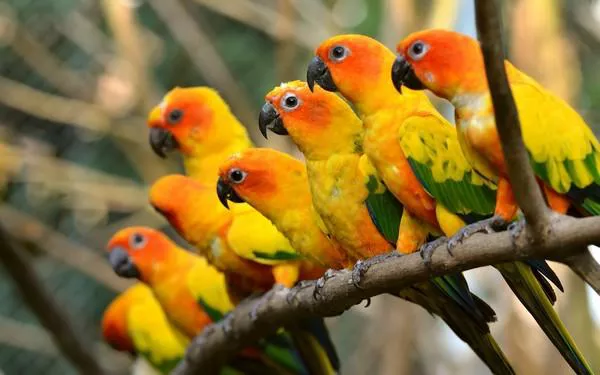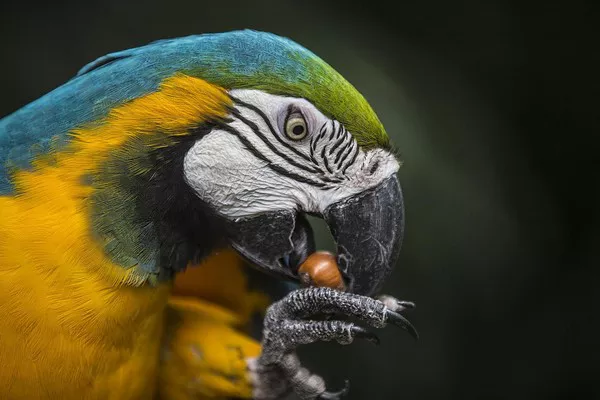Sun Conures, with their vibrant plumage and playful personalities, are a beloved species among bird enthusiasts. Providing the right diet is crucial for maintaining their health and well-being. This comprehensive guide explores the characteristics and living habits of Sun Conures, along with detailed information on their dietary needs to ensure they thrive in a domestic environment.
Characteristics of the Sun Conure
The Sun Conure, or Aratinga solstitialis, is a small, strikingly colorful parrot native to northeastern South America. These birds are known for their radiant yellow, orange, and green feathers, which make them stand out in the avian world. Their lively and affectionate nature, combined with their unique appearance, makes them a popular pet.
Physical Appearance
Sun Conures are small to medium-sized parrots, measuring around 12 to 14 inches in length. Their plumage is a brilliant mix of yellow and orange, with vibrant green on the wings and tail. This striking coloration not only serves as a visual spectacle but also plays a role in their social interactions and mating displays.
Their beaks are strong and curved, adapted for cracking nuts and seeds. They have a zygodactyl foot structure, meaning they have two toes facing forward and two facing backward, which aids in their ability to grasp and manipulate objects. Their bright eyes and expressive facial expressions add to their endearing charm.
Behavior and Personality
Sun Conures are known for their high energy levels and playful demeanor. They are highly social birds that thrive on interaction with their human companions. These parrots are often described as affectionate and can form strong bonds with their owners, seeking attention and companionship throughout the day.
Their vocalizations are loud and varied, ranging from melodious chirps to enthusiastic squawks. While their noise level can be quite high, many owners find their lively communication to be a rewarding aspect of their personality. Sun Conures are also known for their intelligence and curiosity, which makes them quick learners and eager participants in interactive play.
Living Habits of the Sun Conure
Understanding the living habits of Sun Conures is essential for creating an environment that meets their needs and supports their overall well-being. Their natural behaviors and social structure should be considered when planning their diet and daily care.
Social Structure and Interaction
In the wild, Sun Conures live in small flocks and engage in complex social interactions. They rely on their flock mates for companionship, foraging, and protection. In a domestic setting, it is crucial to replicate this social structure by providing ample interaction and mental stimulation.
Sun Conures enjoy spending time with their human families and can become bored or lonely if left alone for extended periods. Providing toys, puzzles, and opportunities for play can help keep them engaged and prevent behavioral issues related to boredom. Social interaction should be a key component of their daily routine.
Housing and Enrichment
Providing a suitable living space for Sun Conures is important for their physical and mental health. Their cage or aviary should be spacious enough to allow for flight and exercise, with horizontal bars that facilitate climbing. Enrichment items such as perches of varying sizes, swings, and chew toys should be included to keep them active and entertained.
Sun Conures also benefit from out-of-cage time, where they can explore and interact with their environment under supervision. This not only provides physical exercise but also helps in strengthening the bond between the bird and its owner.
Nutritional Needs of Sun Conures
Feeding a balanced and nutritious diet is vital for the health and longevity of Sun Conures. Their diet should mimic their natural foraging behavior and provide a range of nutrients to support their active lifestyle. Understanding their dietary requirements can help in making informed choices about their food.
Basic Diet Components
A well-rounded diet for Sun Conures should include a variety of foods to ensure they receive all the essential nutrients. The primary components of their diet are:
Pellets: High-quality pellets are a staple in the diet of Sun Conures. These commercially prepared foods are formulated to provide a balanced mix of vitamins, minerals, and protein. Pellets should constitute a significant portion of their daily intake, as they offer a complete and consistent nutrient profile.
Seeds and Nuts: While seeds and nuts can be a tasty treat for Sun Conures, they should be offered in moderation due to their high fat content. Seeds like sunflower and safflower, as well as nuts such as almonds and walnuts, can be included in their diet but should not replace pellets. A varied seed and nut mix can provide enrichment and additional nutrients.
Fresh Fruits and Vegetables: Fresh produce is an important part of a Sun Conure’s diet, offering vitamins, minerals, and fiber. Fruits such as apples, oranges, berries, and melons, as well as vegetables like carrots, bell peppers, and leafy greens, should be offered daily. It is essential to wash fruits and vegetables thoroughly and remove any seeds or pits that could be harmful.
Sprouted Seeds: Sprouted seeds are a nutritious addition to the diet, as they are rich in vitamins and enzymes that support digestion and overall health. Sprouts should be fresh and washed before offering them to your Sun Conure. Popular choices include alfalfa, mung beans, and lentils.
Foods to Avoid
While a variety of foods is beneficial, certain items should be avoided to ensure the health of Sun Conures. These include:
See Also: What Do Sun Conures Eat in the Wild?
Avocado: Avocado contains a substance called persin, which can be toxic to birds and cause serious health issues.
Chocolate and Caffeine: Both chocolate and caffeine are harmful to birds and can lead to severe health problems or even death.
Salty and Sugary Foods: Foods high in salt or sugar should be avoided, as they can cause imbalances in a bird’s diet and lead to health issues such as obesity and kidney disease.
Processed Foods: Human processed foods, including those with preservatives, artificial colors, and flavorings, are not suitable for Sun Conures and should be kept out of their diet.
Portion Control and Feeding Schedule
Maintaining portion control and a consistent feeding schedule is important for the overall health of Sun Conures. Overfeeding or underfeeding can lead to nutritional imbalances and health problems. The following guidelines can help in managing their diet:
Daily Rations: Provide a balanced amount of pellets, seeds, and fresh produce each day. A general guideline is to offer 60-70% pellets, 10-15% seeds and nuts, and 20-30% fresh fruits and vegetables. Adjust portions based on the bird’s activity level and weight.
Feeding Schedule: Establish a regular feeding schedule to promote a healthy routine. Offer meals at the same time each day and remove any uneaten food to prevent spoilage. Fresh water should always be available, and it should be changed daily to ensure it remains clean.
Monitoring and Adjustment: Regularly monitor your Sun Conure’s weight, behavior, and overall health. If you notice any changes in appetite, weight gain or loss, or changes in droppings, consult a veterinarian for guidance on adjusting their diet.
Special Dietary Considerations
Sun Conures may have specific dietary needs or preferences that should be addressed to ensure their health and happiness.
Hand-Feeding and Weaning
For young Sun Conures that are being hand-fed, a specialized formula is required. Hand-feeding should be done under the guidance of an avian veterinarian or experienced breeder. As the bird matures, gradual weaning to solid foods should be introduced, starting with soft fruits and vegetables.
Health Conditions and Dietary Adjustments
Certain health conditions may require dietary adjustments. For instance, if a Sun Conure is diagnosed with obesity or diabetes, a veterinarian may recommend a specialized diet with reduced fat and sugar content. Regular check-ups and consultations with an avian vet can help manage any dietary needs related to health issues.
Conclusion
Feeding a Sun Conure involves providing a balanced diet that mirrors their natural foraging behavior while addressing their unique nutritional needs. Understanding their characteristics and living habits allows for a more tailored approach to their diet, promoting their health and well-being. By offering a variety of nutritious foods and maintaining a consistent feeding routine, owners can ensure their Sun Conure leads a happy and healthy life. Regular monitoring, along with enrichment and social interaction, completes the care regimen for these vibrant and affectionate birds.
Related Topics:
























